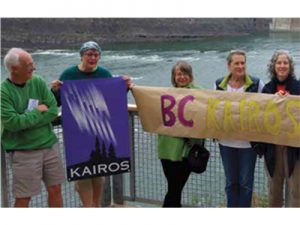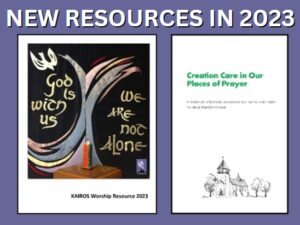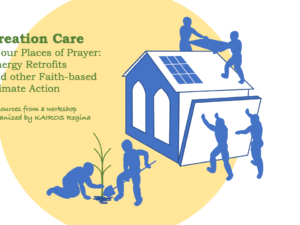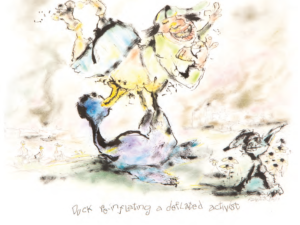Spirited Reflection: Becoming Displaced for Christ

The term ‘epiphany’ comes from the Greek word έπιφάνεια [epiphainein] meaning ‘appearing’, ‘manifestation’ or ‘glorious display.’ In the New Testament, we find that the term appears six times, all having to do with Christ’s coming. In part it encapsulates the deep longing for an encounter with a gracious and life-giving God, and in part, it embraces the invitation for all people to know and make known God’s life-giving purpose. Yet, how does this invitation present itself?
Matthews’ Gospel is the only one of the four Gospels where the Magi appear—though the author never numbers them, the reader sees three gifts: gold, frankincense and myrrh. These valuable items were standard gifts to honor a king or deity in the ancient world: gold as a precious metal, frankincense as perfume or incense, and myrrh as anointing oil. The Book of Isaiah, when describing Jerusalem’s glorious restoration, tells of nations and kings who will come and “bring gold and frankincense and shall proclaim the praise of the Lord” (Isaiah 60:6).
Though the gifts symbolize Jesus’ divinity and royal lineage, the author of the Gospel also highlights the first time the reader sees Jesus welcoming the stranger, since the Magi were Gentiles. Matthew recognizes in chapter one’s genealogy that Gentiles have long participated in God’s purposes—the Gentile Abraham, Gentile women (Tamar, Rahab, Ruth), and imperializing and defeated Babylon (1:11–12). More challenging, the Magi come “from the East,” a place in the ancient world both exotic and feared (the dreaded Parthians lived there). And their epiphany occurs “on the run” so to speak, far from home, as they travel to Jerusalem.
Sometimes epiphanies are dramatic like John’s in Revelation 1 or Paul’s in 2 Corinthians 12. But that is not where Matthew’s emphases lie. This passage presents them as inconvenient and unconventional, dangerous and destabilizing. It is a process–not a moment, a dawning–not an instance, a dusty, thirsty, laborious, inconvenient, and dangerous journey–not a hallowed, gratuitous, spontaneous nano-second. For Matthew, epiphanies occur in unlikely places with unlikely people at unlikely times by unlikely means.
It is significant that in this text, Jesus has a home, he has a tradition and culture, and he is not displaced. Here, he is not the one who goes out and encounters us, in all of our different locations and situations. Instead, we come to Him. We make the response, all of us, to leave our homes. We venture forth and become travelers on a journey, we become displaced, we accept God’s invitation in order to seek Jesus. The epiphany of the Magi calls us to reflect more on the ways Jesus requires us to leave our homes, our places of comfort—and go to places that are uncomfortable, and where we ourselves are displaced, just like the Magi. In those places, we shall see Christ.
This exodus calls for a spirituality of accompanying. Accompaniment is making oneself available to others. It is the sign of sharing one’s life with the other. It expresses one’s openness to the other, accepting the fact that we are persons in one human family. True to its etymological roots, accompaniment involves ‘breaking bread’ with those in need. It means becoming a companion and friend to the other on a shared journey. It involves being attentive to the integrated nature of the people that one serves including their social, physical, and psychological needs. It is taking care of their needs with humility. This is what Kristin E. Heyer terms “incarnational solidarity” which departs from valuable intellectual and institutional dimensions of solidarity to immerse ones’ bodies and expend precious energy into practices of presence and service in the real world. Incarnational solidarity demands that people leave their comfort and struggle with discomfort, language, and cultural barriers in order to allow cultivating, concrete, habitual ways of acknowledging our “we-ness” by being with the neighbour, especially the needy and suffering neighbour. In the book Kinship Across Borders: A Christian Ethic of Immigration, Heyer expands, incarnational solidarity calls one to walk in the shoes of others, accompanying them on their journey in order to create concrete relationships with the marginalized.
Victoria Blanco recently graduated from the Catholic University of Leuven with a Master’s Degree in Theology and Religious Studies.
This reflection is excerpted from Gifts for Another Way, Epiphany Year B Resource for Justice Seekers, available through KAIROS.







